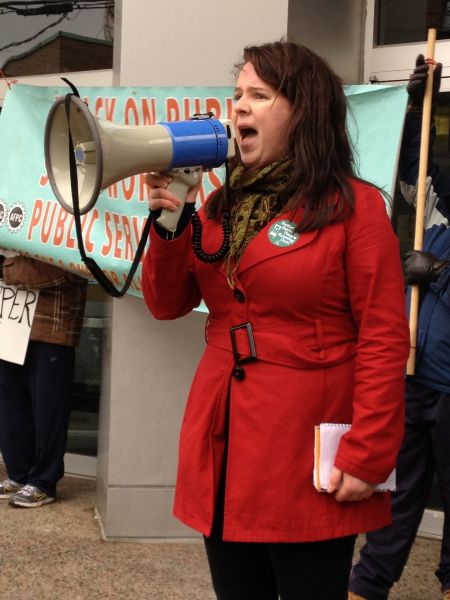Cape Breton faces a unique set of issues in Nova Scotia, many related to employment.
2012 sees an increasingly post-industrial Cape Breton, and the days of large-scale coal extraction and steelworks are in some sense becoming the thing of folk song. While industry carries on in some capacity, many jobs are now centred around low-paying positions in the service sector.
This presents a whole new battlefield for a region that is soaked in the history of union struggle, says Suzanne MacNeil, recording secretary of the Cape Breton District Labour Council and member of the Canadian Freelancers Union.
“When I look at the current political and social conditions in Cape Breton, I think that we obviously don't enjoy the same type of union density that we once had,” says MacNeil. “But at the same time, when you consider the old industrial jobs such as coal or steel, they didn't come into this area with tons of benefits and a living wage. The history is that the workers had to come together and fight, and literally die for these to be good jobs.”
Cape Breton is facing a declining and aging population, where remittance money from job-seekers in points westward plays a significant part in sustaining those who stay behind. Work may be seasonal, families face extended periods of separation, and local jobs are increasingly sought after.
The surplus of labour in Cape Breton means that a whole new struggle looms for workers who remain in the region.
“In our local economy here...there are a limited number of good paying jobs,” says MacNeil. “But I see this increasingly coming back to that time period before the big labour wars of the 1920s where there are a lot of people really struggling, and there are a lot of workplaces that provide jobs that are not stable, jobs that pay poorly...and I think that it's very much at this point in history where we have to say 'Okay, what can we do to get some type of economic justice back on the table?'”
From periods of struggle, however, come innovation, solidarity and the potential for renewed strength. MacNeil sees a renewed role for unions in 2012 Cape Breton, and not just in terms of “straight-up” employment issues.
The population demographic is shifting; Mi'kmaw youth from all corners of Unamaki (Cape Breton in Mi'kmaw) are increasingly seeking employment in the urban centres and face “tons and tons” of discrimination, according to MacNeil; there is also a real prescription-drug addiction problem in the region.
MacNeil sees the opportunity for the labour struggle to address all these issues.
“Now is the time to rediscover what it means to really struggle for some basic economic rights,” says MacNeil. “I think very much that the post-war economic consensus has died. Ever since neo-liberalism got up and running in the '70s, we've been trying to fight back a lot of the encroachments of very right-wing ideology, and we need to realize that.
“As young trade unionists we're heading into some really tough times," she says, "and we're going to have to rediscover what it means to walk picket lines, and organize each other, and fight for what we think we deserve.”
You can catch Suzanne MacNeil speaking about the challenges facing youth and women in the current Cape Breton labour movement at the upcoming State of Our Unions panel discussion on February 22 from 6:30 - 9:00 at Just Us! Coffee House, 5896 Spring Garden Rd.



